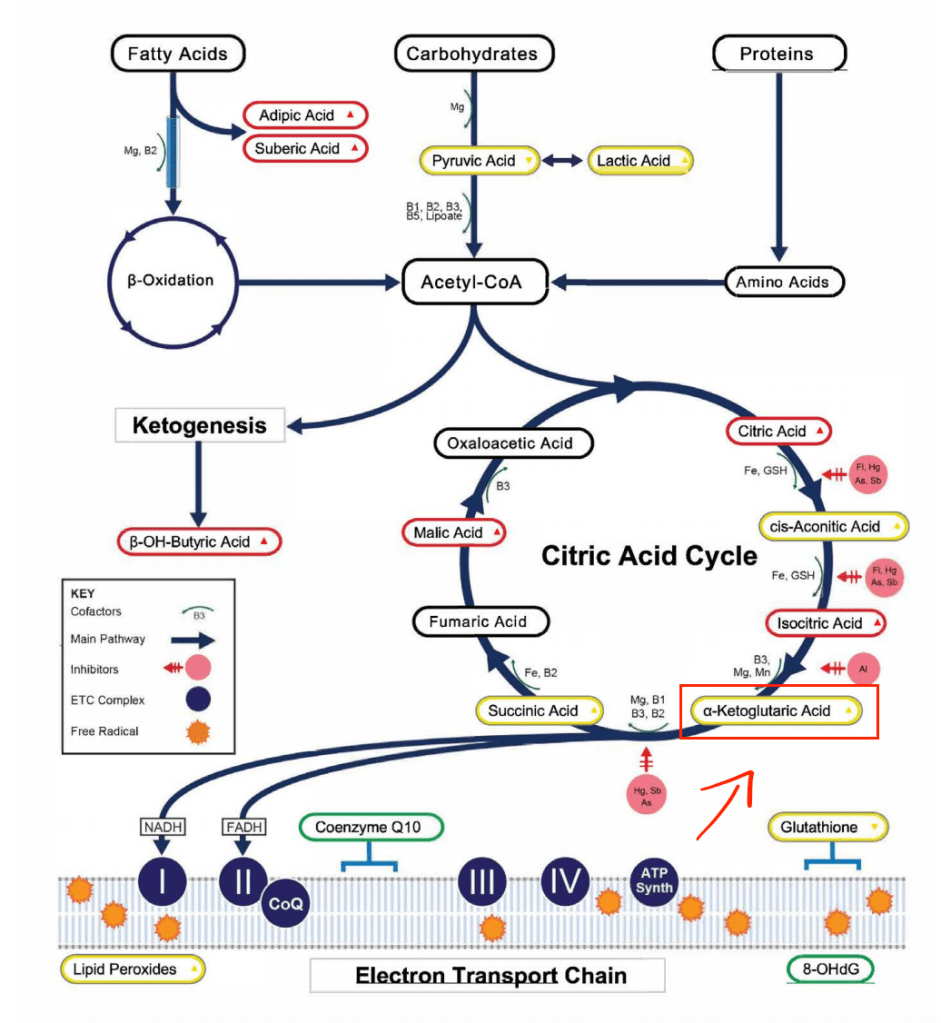Alpha-Ketoglutarate is an organic acid that is important for the proper metabolism of all essential amino acids. It is formed in the Krebs cycle, the energy-producing process that occurs in most body cells.
The Krebs cycle (aka Citric Acid cycle) is a series of chemical reactions used by all aerobic organisms to release stored energy through the oxidation of acetyl-CoA derived from carbohydrates, fats, and proteins into ATP.
AKG (alpha-ketoglutarate) is the nitrogen-free portion of the amino acids known as glutamine and glutamic acid, which is involved in protein synthesis that may play a role in supporting healthy blood glucose levels. Alpha-ketoglutarate (AKG) helps maintain normal levels of ammonia in the brain, muscles and kidneys, as well as the body’s nitrogen balance in body tissues and fluids.
AKG is used by cells during growth and in healing from injuries and other wounds, and is especially important in the healing of muscle tissue.
α-Ketoglutarate is one of the most important nitrogen transporters in metabolic pathways. The amino groups of amino acids are attached to it (by transamination) and carried to the liver where the urea cycle takes place.
Isocitric Acid is converted to α-ketoglutaric acid using the enzyme isocitrate dehydrogenase. Alphaketoglutarate is a rate-determining intermediate in the Citric Acid Cycle and provides an important source of glutamine and glutamate that stimulates protein synthesis and bone tissue formation, inhibits protein degradation in muscle, and constitutes an important metabolic fuel for cells of the gastrointestinal tract.
Alpha-ketoglutaric acid is then converted to Succinyl CoA using the enzyme alpha-ketoglutarate dehydrogenase. This enzyme complex is very similar to the pyruvate dehydrogenase complex with similar nutrient cofactor needs.
High Levels:
Elevations can be seen with nutrient cofactor deficiencies needed for the enzymatic conversion of
α-ketoglutarate such as vitamin B₃, zinc, magnesium, and manganese. Higher levels are seen in mitochondrial oxidative phosphorylation disorders and mitochondrial dysfunction.
Genetic abnormalities with the enzyme itself can also limit conversion of alpha-ketoglutarate,
causing elevations.
Low Levels:
Low levels of α-ketoglutarate may reflect lack of precursors higher up from enzymatic dysfunction due to lack of nutritional cofactors, genetic defects, or toxin exposures.

More on the Citric Acid Cycle:
The cellular energy and mitochondrial metabolite markers reflect the body’s ability to process dietary macronutrients to feed the Citric Acid Cycle and subsequent energy production. Abnormalities throughout the Citric Acid Cycle, as well as in fatty acid oxidation, glycolysis, and protein metabolism may reflect enzymatic dysfunction and functional nutrient insufficiencies.
Various factors can alter mitochondrial enzymes such as nutrient and vitamin deficiency, toxins, genetic polymorphisms, and underlying disease. The enzymes catalyzing the transformation of these Citric Acid Cycle intermediates require a variety of nutrient cofactors, such as iron, niacin, magnesium, manganese, thiamin, riboflavin, pantothenic acid, and lipoic acid. Toxic exposures and metals including, but not limited to, mercury, arsenic, and lead can interfere with mitochondrial function.
Abnormal urinary excretion of these organic acids may provide a window into various clinical conditions, as well as potential therapeutic targets to correct mitochondrial dysfunction.
Mitochondrial dysfunction has been associated with several diseases. The presence of enzymatic antagonists within the Citric Acid Cycle, or lack of specific nutrient cofactors for these enzymes, may contribute to mitochondrial dysfunction, and therefore conditions like neurocognitive disease, diabetes, cancer, mood disorders, cardiovascular disease, and chronic fatigue syndrome.
Disclaimer:
Test results may vary depending on your age, gender, health history, the method used for the test, and other things. Your test results may not mean you have a problem. Ask your healthcare provider what your test results mean for you.
The information on healthmatters.io is NOT intended to replace a one-on-one relationship with a qualified health care professional and is not intended as medical advice.
